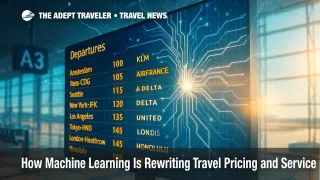How Machine Learning Is Rewriting Travel Pricing and Service

Machine learning in travel is no longer a pilot project. Delta Air Lines is expanding AI-powered dynamic pricing from 3 percent of tickets to 20 percent by December 2025, part of an industry-wide pivot toward data-driven personalization. Airlines, hotels, and online agencies now use algorithms to predict demand, fine-tune rates, and optimize operations in real time. The promise: higher efficiency and tailored experiences. The risk: opaque pricing and new ethical headaches.
Key Points
- Delta will let AI set 20 percent of fares by year-end.
- Fetcherr's machine-learning engine replaces static price bands with real-time forecasts.
- Hotels employ ML for revenue management, energy savings, and guest upsells.
- Online travel agencies deploy conversational AI to plan trips end-to-end.
- Why it matters: Personalized prices could boost profits but erode fare transparency.
Snapshot
Machine learning (ML) refers to software that trains on vast datasets to identify patterns and make predictions without explicit programming. In travel, ML ingests historical bookings, competitor rates, weather, and macro demand signals to forecast the "next best action"-whether that is an airfare, a room rate, a chatbot reply, or an equipment-maintenance alert. The technology's real-time speed enables suppliers to update prices or schedules in seconds, far faster than legacy revenue-management cycles. For travelers, that can translate into more tailored offers-but also constantly shifting prices that are hard to benchmark.
Background
Airlines have practiced dynamic pricing for decades, yet traditional systems relied on manually tuned fare classes. In 2023 Delta announced a strategic partnership with Israeli startup Fetcherr to replace that system with ML models that predict a passenger's willingness to pay. Early tests on 3 percent of fare inventory delivered what Delta president Glen Hauenstein called "amazingly favorable" results, prompting this year's scale-up. Similar thinking permeates hospitality. Marriott's One Yield revenue platform now layers in ML-enhanced demand forecasts, while Hilton leverages predictive analytics to trim energy use across its LightStay-monitored properties. Online travel agencies, meanwhile, court consumers with AI trip planners and real-time rebooking tools.
Latest Developments
Delta's Next Pricing Frontier
During Delta's July 10 earnings call, Hauenstein told investors the carrier aims to "do away with static pricing altogether," envisioning seats priced for "that flight, that time, and you, the individual." By December, one in five fares will be set by Fetcherr's algorithm, with universal AI pricing the long-term goal. Privacy advocates warn that the system could charge higher prices to less price-sensitive travelers, potentially triggering class-based discrimination. Arizona Senator Ruben Gallego labeled the approach "predatory pricing" in a July 15 post on X.
Hotels Double Down on Revenue Science
Marriott now feeds billions of booking records into upgraded ML models that refresh room rates in near-real time for both transient and group segments. Third-party studies credit the shift with two- to three-point RevPAR lifts. Beyond rates, Hilton reports its AI energy-management program has saved more than $1 billion while cutting carbon output by 30 percent, proving that ML can lower costs as well as raise revenue.
OTAs Turn AI into a Travel Buddy
Expedia's "Romie" assistant parses customer messages to build entire itineraries, auto-book ancillaries, and nudge travelers when prices drop. Kayak is testing tools that convert social-media posts into day-by-day plans. These agents rely on large language models (LLMs) fine-tuned on supplier feeds, user reviews, and historical searches-reducing friction from inspiration to checkout.
Analysis
Dynamic ML pricing promises leaner inventory management and tailored offers, but it also muddies the notion of a "fair" fare. Travelers have long compared prices across browsers and ZIP codes; now the price may change simply because an algorithm decides you can absorb it. Regulators could step in if evidence mounts that protected classes systematically pay more. Hotels face a similar balancing act: real-time rate moves improve yield yet risk confusing guests who book direct, cancel, then see a different price minutes later. On the upside, ML keeps planes fuller, reduces food waste, and automates tedious planning tasks. Generative-AI tools such as Adept Traveler's own guide to ChatGPT for travel planning show how conversational ML can streamline research before the first ticket is even purchased. As adoption spreads, transparency-clear disclosures, opt-outs, and algorithmic audits-will be critical to maintain consumer trust.
Final Thoughts
Machine learning in travel is shifting from experiment to infrastructure. Whether optimizing fares, energy use, or itinerary planning, the technology already touches every stage of the journey. How responsibly companies wield that power will determine if travelers view ML as an ally-or an invisible surcharge. One thing is certain: the era of static pricing is on its final approach, and machine learning in travel is cleared to land.
Sources
- Delta moves toward eliminating set prices in favor of AI
- Delta Air Lines is using AI to set the maximum price you're willing to pay
- Delta encouraged by early results of AI pricing with Fetcherr
- Sen. Ruben Gallego on AI pricing
- Put Your Trip on Autopilot - Expedia Group
- Case Studies: AI in Revenue Management at Leading Hotel Chains
- Hilton's AI-Driven Energy Management Achieves $1 Billion Savings
